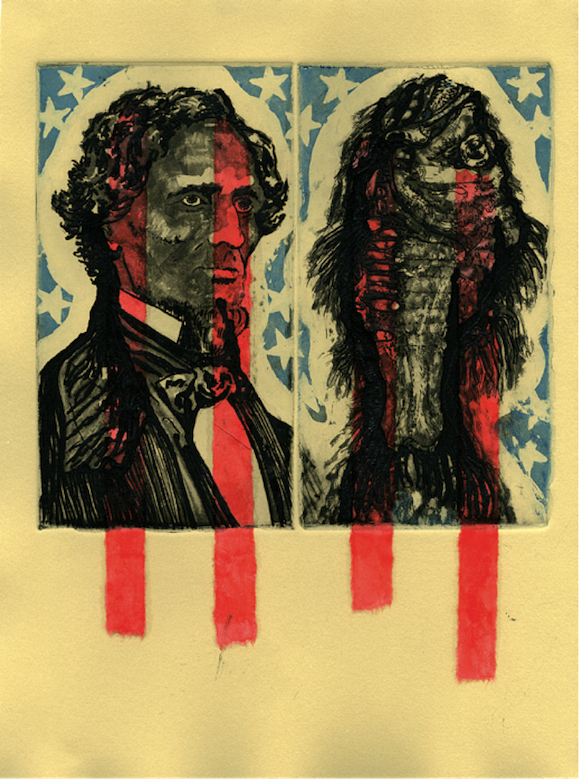 |
| Kristen Casaletto, Apocalypse, 2008 |
Casaletto’s work deals with contemporary American culture and identity by combining visual motifs from both the past and the present. She draws upon a historic and mythic past, employing a complex iconography of American images and ideas. Through these means, she produces an allegorically imagined exploration of life in the 21st century. The title of the exhibition comes from a quote from William Faulkner: “The past is never dead. It's not even past.” Like Faulkner, Casaletto’s work insists on the overwhelming impact of the past on the present.
 |
| Kristen Casaletto, Lost Cause: Jefferson Davis / Dead Fish, 2010 |
“Lost Cause: Jefferson Davis / Dead Fish” (not featured in the exhibition but shown here) exemplifies this idea. The piece currently belongs to the collection of the Georgia Museum of Art and was released in Casaletto’s “American Parable” series. The color etching features a depiction of the president of the secessionist Confederacy, Jefferson Davis, next to a dead fish, all embedded within the stars and stripes of the American flag. By positioning the visage of Davis and the form of the dead fish in parallel arrangements, Casaletto introduces a strong juxtaposition of imagery. By doing so, she presents a work open to multiple interpretations. The composition might emphasize Jefferson Davis’s now obsolete position in American culture — like that of a dead fish — while still reinforcing the way in which certain ideas and symbols become a part of a grander cultural narrative. The Confederate States of America, to most a dark part of American history, still looms large in the narrative of the American South. The stars and stripes of the American flag emphasize the role of America’s dark past in its current culture. There are many layers of allusion to the piece, each enhancing its referentially rich yet semantically ambiguous wealth of iconography.
Kristin Casaletto is a quintessential contemporary artist, which we tend to think of as an artist living and working in the 21st century. By nature, contemporary artists are engaged with the present and its cultural dialogue. They often look to current issues in their society and produce art that is engrossed in these problems. Contemporary art in the greater historical context is also defined by a lack of overarching narrative or stylistic form between artists. In other words, there is no singular, cohesive way of producing art but rather a diverse mix of individual practices. For visitors, “Kristen Casaletto: The Past is Never Dead” is an opportunity to contemplate the complex politics of the past and where we are today.
Jamie Brener
Publications Intern

No comments:
Post a Comment